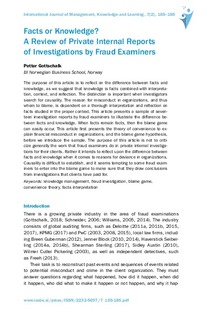Facts or knowledge? A Review of private internal reports of investigations by Fraud examiners
Peer reviewed, Journal article
Published version
Permanent lenke
http://hdl.handle.net/11250/2578314Utgivelsesdato
2018Metadata
Vis full innførselSamlinger
- Publikasjoner fra CRIStin - BI [1015]
- Scientific articles [2181]
Originalversjon
International Journal of Management, Knowledge and Learning. 2018, 7 (2), 165-187.Sammendrag
The purpose of this article is to reflect on the difference between facts and knowledge, as we suggest that knowledge is facts combined with interpreta-tion, context, and reflection. The distinction is important when investigators search for causality. The reason for misconduct in organizations, and thus whom to blame, is dependent on a thorough interpretation and reflection on facts studied in the proper context. This article presents a sample of seven-teen investigation reports by fraud examiners to illustrate the difference be-tween facts and knowledge. When facts remain facts, then the blame game can easily occur. This article first presents the theory of convenience to ex-plain financial misconduct in organizations, and the blame game hypothesis, before we introduce the sample. The purpose of this article is not to criti- cize generally the work that fraud examiners do in private internal investiga-tions for their clients. Rather it intends to reflect upon the difference between facts and knowledge when it comes to reasons for deviance in organizations. Causality is difficult to establish, and it seems tempting to some fraud exam-iners to enter into the blame game to make sure that they draw conclusions from investigations that clients have paid for.
